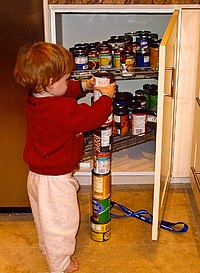
Photo from wikipedia
In the VANILLA phase 2 clinical trial, balovaptan treatment resulted in improved adaptive behaviors in adult men with autism. Modulating vasopressin in ASD The neuropeptide vasopressin has been implicated in… Click to show full abstract
In the VANILLA phase 2 clinical trial, balovaptan treatment resulted in improved adaptive behaviors in adult men with autism. Modulating vasopressin in ASD The neuropeptide vasopressin has been implicated in the regulation of social behaviors in animals and humans. The VANILLA clinical trial evaluated balovaptan, an oral selective vasopressin V1a receptor antagonist, in 223 men with autism spectrum disorder (ASD). This 12-week phase 2 trial showed no improvement on the primary endpoint (SRS-2 score) but did show improvement on the secondary outcome measure of adaptive behaviors assessed by the Vineland-II scale (Bolognani et al.). In a related clinical study involving a 4-week intranasal administration of vasopressin to children with ASD, improvements were observed on the SRS-2 primary outcome measure (Parker et al.). Both drugs were well tolerated and had an acceptable safety profile, suggesting that modulating the vasopressin pathway may be a useful therapeutic strategy for ASD. There are no approved pharmacological therapies to address the core symptoms of autism spectrum disorder (ASD), namely, persistent deficits in social communication and social interaction and the presence of restricted, repetitive patterns of behaviors, interests, or activities. The neuropeptide vasopressin has been implicated in the regulation of social behaviors, and its modulation has emerged as a therapeutic target for ASD. The phase 2 VANILLA clinical trial reported here evaluated balovaptan, an orally administered selective vasopressin V1a receptor antagonist, in 223 men with ASD and intelligence quotient ≥70. The drug was administered daily for 12 weeks and was compared with placebo. Participants were randomized to placebo (n = 75) or one of three balovaptan dose arms (1.5 mg, n = 32; 4 mg, n = 77; 10 mg, n = 39). Balovaptan treatment was not associated with a change from baseline compared with placebo at 12 weeks in the primary efficacy endpoint (Social Responsiveness Scale, 2nd Edition). However, dose-dependent and clinically meaningful improvements on the Vineland-II Adaptive Behavior Scales composite score were observed for participants treated with balovaptan 4 or 10 mg compared with placebo. This was driven principally by improvements in the Vineland-II socialization and communication scores. Balovaptan was well tolerated across all doses, and no drug-related safety concerns were identified. These results support further study of balovaptan as a potential treatment for the socialization and communication deficits in ASD.
Journal Title: Science Translational Medicine
Year Published: 2019
Link to full text (if available)
Share on Social Media: Sign Up to like & get
recommendations!